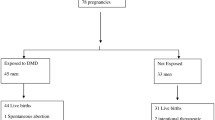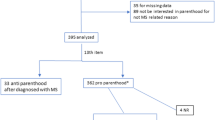Abstract
Little is known about the influence of immunomodulation on parenthood, in particular paternity in multiple sclerosis (MS). The objective was to determine whether there is an increased risk for pregnancies initiated by MS-parents under disease modifying therapies (DMT). We investigated the clinical outcome of pregnancies fathered by MS-patients under DMT by nationwide questionnaire and within our own outpatient clinic. Additionally, we compared the birth weight of children from MS-fathers exposed to DMT, MS-mothers without DMT, MS-mothers under interferon-beta (IFN β) at the time of conception and healthy controls (HCs). DMT was reported for 32 paternities of 46 children; 30 under IFN β, 12 under glatiramer acetate, 2 under natalizumab, 1 under methotrexate and 1 under combined azathioprine- and IFN β-1b-treatment. Six (13%) pregnancies ended in early spontaneous abortions; of the 40 children of MS-fathers under DMT, 2 (5%) were preterm, 1 (2.5%) had a spinal lipoma and 3 (7.5%) had moderate hip dysplasia, of whom 2 were siblings whose mother had severe hip dysplasia. Mean birth weight of newborns from MS-fathers under DMT was not significantly reduced compared to HCs. Comparing birth weight of newborns of MS-mothers versus MS-fathers, we found a significant difference to the disadvantage of MS-mothers with or without IFN β-treatment. No statistical difference in birth weight of IFN β-exposed versus untreated MS-mothers was observed. Despite the small numbers, our available data suggest safe paternity by MS-patients. IFN β-treatment of mothers does not seem to have an impact on birth weight, however, MS may contribute to a reduced birth weight.

Similar content being viewed by others
References
Orton SM, Herrera BM, Yee IM, Valdar W, Ramagopalan SV, Sadovnick AD, Ebers GC, Canadian Collaborative Study Group (2006) Sex ratio of multiple sclerosis in Canada: a longitudinal study. Lancet Neurol 5:932–936
Parker JD, Schoendorf KC (1992) Influence of paternal characteristics on the risk of low birth weight. Am J Epidemiol 136:399–407
Sandberg-Wollheim M, Frank D, Goodwin TM, Giesser B, Lopez-Bresnahan M, Stam-Moraga M, Chang P, Francis GS (2005) Pregnancy outcomes during treatment with interferon beta-1a in patients with multiple sclerosis. Neurology 65:802–806
Boskovic R, Wide R, Wolpin J, Bauer DJ, Koren G (2005) The reproductive effects of beta interferon therapy in pregnancy: a longitudinal cohort. Neurology 65:807–811
Hellwig K, Brune N, Haghikia A, Müller T, Schimrigk S, Schwödiauer V, Gold R (2008) Reproductive counselling, treatment and course of pregnancy in 73 German MS patients. Acta Neurol Scand 118:24–28
García-Enguídanos A, Calle ME, Valero J, Luna S, Domínguez-Rojas V (2002) Risk factors in miscarriage: a review. Eur J Obstet Gynecol Reprod Biol 102:111–119
Tomà P, Valle M, Rossi U, Brunenghi GM (2001) Paediatric hip-ultrasound screening for developmental dysplasia of the hip: a review. Eur J Ultrasound 14:45–55
Dahl J, Myhr KM, Daltveit AK, Gilhus NE (2008) Pregnancy, delivery and birth outcome in different stages of maternal multiple sclerosis. J Neurol 255:623–627
Bar-Oz B, Moretti ME, Mareels G, Van Tittelboom T, Koren G (1999) Reporting bias in retrospective ascertainment of drug-induced embryopathy. Lancet 354:1700–1701
Acknowledgment
The authors thank the patients for their voluntary participation and the German MS society. We thank Dr. M. Voigt, who provided us information about paternal influence on birth weight out of the German Perinatal Registry. This study was partly supported by Biotest, Biogen-Idec, Germany, Merck-Serono and Teva Aventis Pharmaceuticals.
Author information
Authors and Affiliations
Corresponding author
Rights and permissions
About this article
Cite this article
Hellwig, K., Haghikia, A. & Gold, R. Parenthood and immunomodulation in patients with multiple sclerosis. J Neurol 257, 580–583 (2010). https://doi.org/10.1007/s00415-009-5376-z
Received:
Revised:
Accepted:
Published:
Issue Date:
DOI: https://doi.org/10.1007/s00415-009-5376-z




